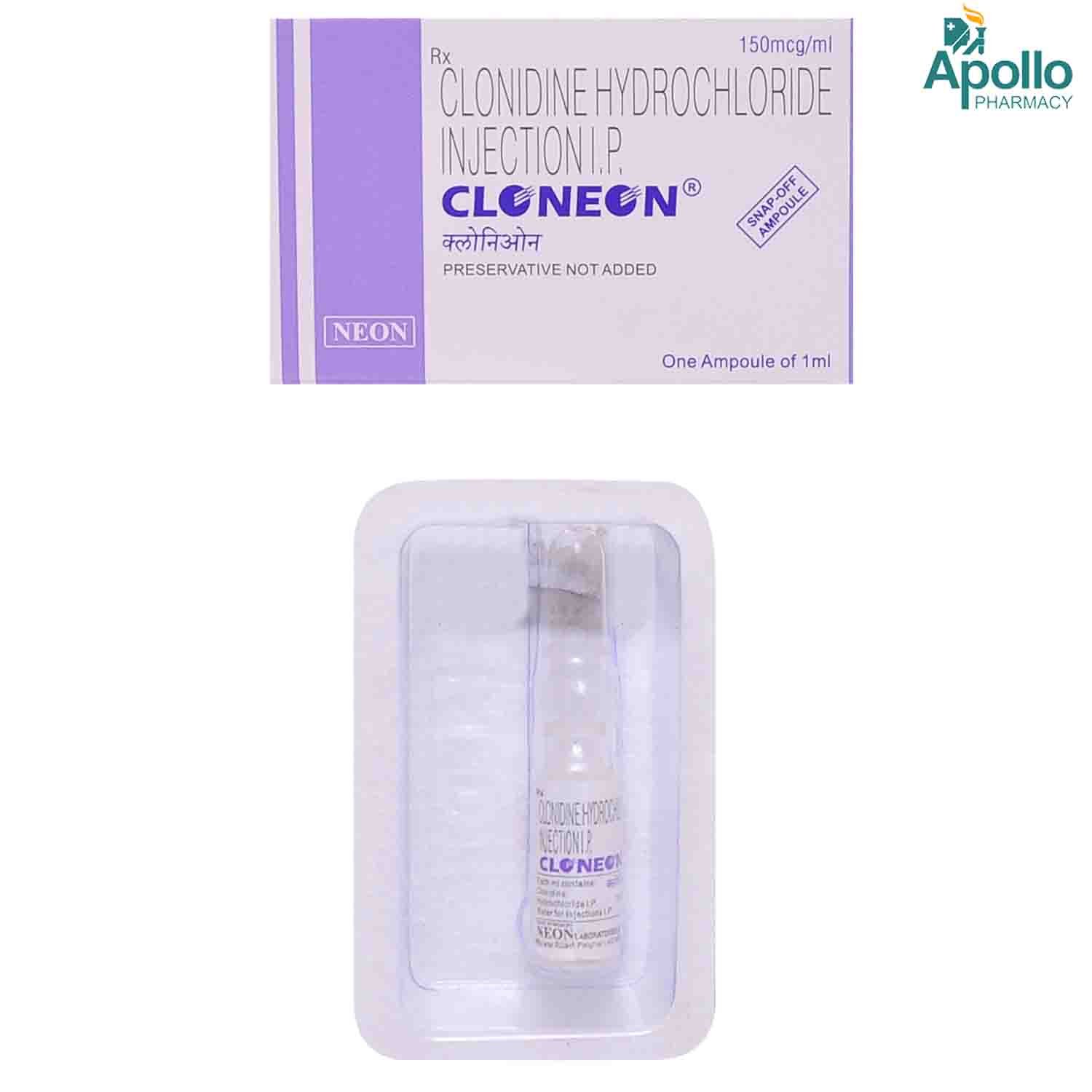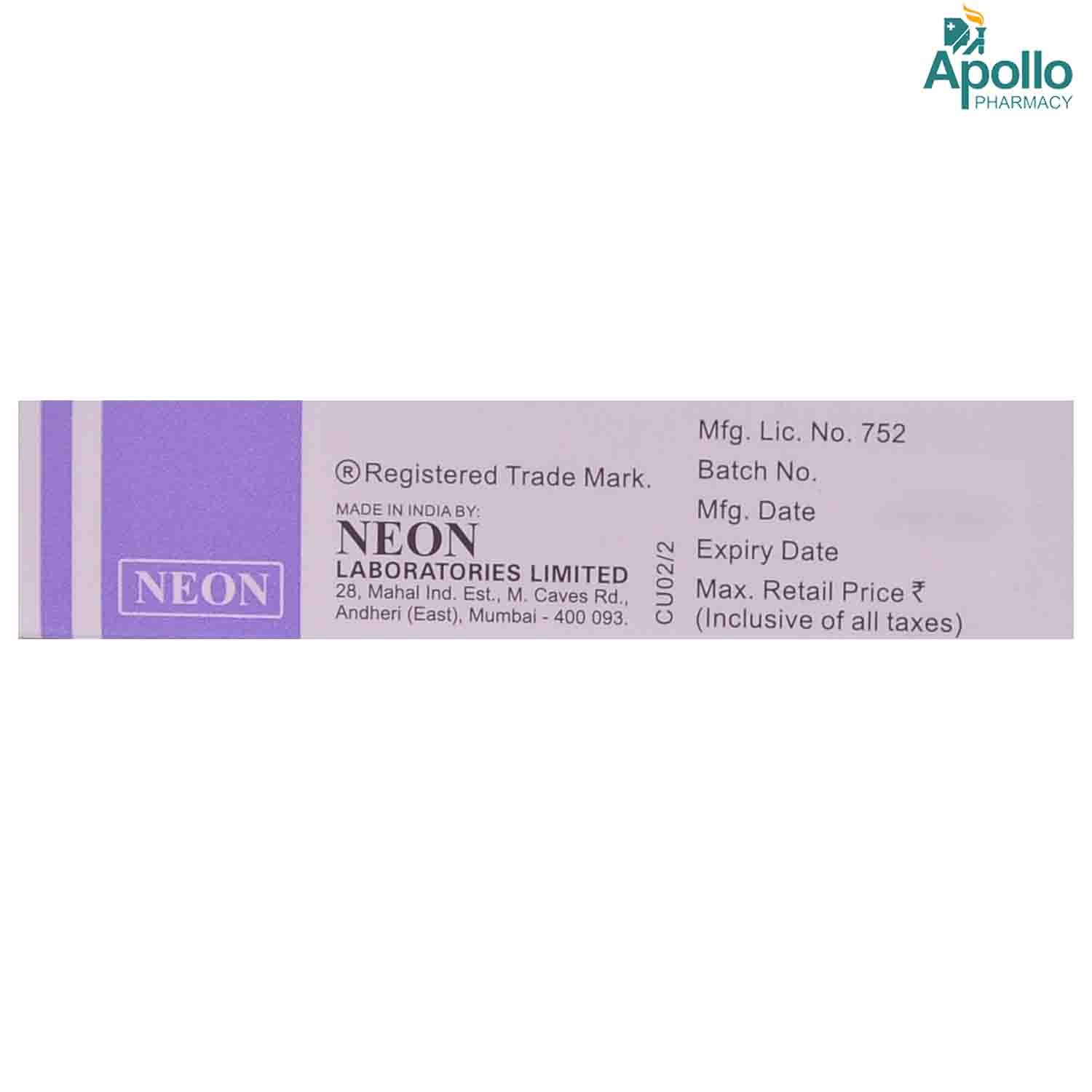Cloneon Injection 1 ml
MRP ₹90.5
(Inclusive of all Taxes)
₹13.6 Cashback (15%)
Provide Delivery Location

secured payment

india's most trusted pharmacy

genuine products
Composition :
Manufacturer/Marketer :
Consume Type :
Expires on or after :
Return Policy :
About Cloneon Injection 1 ml
Cloneon Injection 1 ml belongs to a class of medicines called antihypertensives used to treat hypertension (high blood pressure). Besides this, Cloneon Injection 1 ml is also used alone or in combination with opiate medicines for the treatment of severe pain in cancer patients which is not sufficiently relieved by opioid analgesics alone.
Cloneon Injection 1 ml relaxes and widens the blood vessels making it easier for the heart to pump blood to all parts of the body. This helps in lowering the blood pressure and the risk of having a heart attack or stroke. Also, Cloneon Injection 1 ml prevents the transmission of pain signals to the brain, thereby providing relief from pain.
In some cases, Cloneon Injection 1 ml may cause dry mouth, headache, dizziness, nausea, postural hypotension and low blood pressure. Most of these side effects do not require medical attention and will resolve gradually over time. However, you are advised to talk to your doctor if you experience these side effects persistently.
Cloneon Injection 1 ml is not recommended for obstetrical (related to childbirth), post-partum, or peri-operative pain management. Consult your doctor if you are pregnant or planning for pregnancy. Avoid breastfeeding while taking Cloneon Injection 1 ml. Cloneon Injection 1 ml may cause dizziness, so drive only if you are alert. Keep your doctor informed about your health condition and medications to rule out any interactions/side effects.
Uses of Cloneon Injection 1 ml

Have a query?
Directions for Use
Key Benefits
Cloneon Injection 1 ml is used to treat hypertension (high blood pressure). Cloneon Injection 1 ml relaxes and widens the blood vessels making it easier for the heart to pump blood to all parts of the body. This helps in lowering the blood pressure and the risk of having a heart attack or stroke. Cloneon Injection 1 ml is also used alone or in combination with opiate medicines for the treatment of severe pain in cancer patients which is not sufficiently relieved by opioid analgesics alone. Cloneon Injection 1 ml prevents the transmission of pain signals to the brain, thereby providing relief from pain.
Storage
Drug Warnings
Do not take Cloneon Injection 1 ml if you are allergic to any of its contents. Inform your doctor if you have/had bleeding problems, circulation problems, stroke, depression, diabetes, nervous problems, constipation, phaeochromocytoma (tumour of adrenal glands), heart, kidney or liver problems. Consult your doctor if you are pregnant or breastfeeding. Cloneon Injection 1 ml is not recommended for children as safety and effectiveness have not been established. Cloneon Injection 1 ml may cause dizziness, so avoid driving or operating machinery unless you are alert.
Drug-Drug Interactions
Drug-Drug Interactions
Login/Sign Up
Co-administration of Cloneon Injection 1 ml and Amoxapine may increase the risk and severity of increased side effects.
How to manage the interaction:
Although there is a possible interaction between Cloneon Injection 1 ml and Amoxapine, you can take these medicines together if prescribed by a doctor. However, contact a doctor if you experience sweating, nausea, vomiting, dizziness, flushing, stiff neck, headache, or heart palpitations. Do not discontinue the medication without consulting a doctor.
Co-administration of Cloneon Injection 1 ml and Nadolol may lower blood pressure and slower heart rate.
How to manage the interaction:
Although there is a possible interaction between Cloneon Injection 1 ml and Nadolol, you can take these medicines together if prescribed by your doctor. However, if you experience headaches, slow heartbeat, dizziness, or feeling like you might pass out, contact your doctor. Do not discontinue the medication without consulting a doctor.
Co-administration of Cloneon Injection 1 ml and Butorphanol may increase side effects such as drowsiness, dizziness, confusion, and difficulty concentrating.
How to manage the interaction:
Although there is a possible interaction between Cloneon Injection 1 ml and Butorphanol, you can take these medicines together if prescribed by your doctor. Avoid activities requiring mental alertness such as driving or operating hazardous machinery until you know how the medications affect you. Do not discontinue the medication without consulting a doctor.
The combination of esmolol and Cloneon Injection 1 ml may reduce your blood pressure and lower your heart rate.
How to manage the interaction:
Although there is a possible interaction between Esmolol and Cloneon Injection 1 ml, you can take these medicines together if prescribed by a doctor. However, if you may experience a sluggish heartbeat, headaches, dizziness, or the sensation of passing out, consult the doctor. Do not discontinue any medications without consulting the doctor.
Co-administration of Cloneon Injection 1 ml and Acebutolol may lower blood pressure and slower heart rate.
How to manage the interaction:
Although there is a possible interaction between Cloneon Injection 1 ml and Acebutolol, you can take these medicines together if prescribed by a doctor. However, if you experience headaches, slow heartbeat, dizziness, or feeling like you might pass out, contact a doctor. Do not discontinue the medication without consulting a doctor.
Taking Cloneon Injection 1 ml and Betaxolol together may lower blood pressure and slower heart rate.
How to manage the interaction:
Although there is a possible interaction between Cloneon Injection 1 ml and Betaxolol, you can take these medicines together if prescribed by a doctor. However, if you experience headaches, slow heartbeat, dizziness, consult a doctor. Do not discontinue the medication without consulting a doctor.
Co-administration of Cloneon Injection 1 ml and Sotalol may lower blood pressure and slower heart rate.
How to manage the interaction:
Although there is a possible interaction between Cloneon Injection 1 ml and Sotalol, you can take these medicines together if prescribed by a doctor. However, if you experience headaches, slow heartbeat, dizziness, or feeling like you might pass out, contact a doctor. Do not discontinue the medication without consulting a doctor.
Co-administration of Cloneon Injection 1 ml can enhance the sedative effects of Sodium oxybate on the central nervous system.
How to manage the interaction:
Co-administration of Cloneon Injection 1 ml with Sodium oxybate can possibly result in an interaction, but it can be taken if a doctor has advised it. It's important to keep an eye on your health and be aware of any changes. If you notice any of these signs - feeling tired, dizzy, lightheaded, confused, sad, having low blood pressure, or difficulty breathing - make sure to contact your doctor right away. Do not stop using any medications without talking to a doctor.
Co-administration of Cloneon Injection 1 ml and Pindolol may lower blood pressure and slower heart rate.
How to manage the interaction:
Although there is a possible interaction between Cloneon Injection 1 ml and Pindolol, you can take these medicines together if prescribed by your doctor. However, if you experience headaches, slow heartbeat, dizziness, or feeling like you might pass out, contact your doctor.
Co-administration of Cloneon Injection 1 ml and Clomipramine may increase the risk and severity of increased blood pressure.
How to manage the interaction:
Although taking clomipramine and Cloneon Injection 1 ml together can cause an interaction, it can be taken if a doctor has suggested it. However, contact a doctor immediately if you experience any symptoms such as dizziness, lightheadedness, fainting, shortness of breath, or heart palpitations. Do not discontinue any medications without consulting a doctor.
Drug-Food Interactions
Drug-Food Interactions
Login/Sign Up
Diet & Lifestyle Advise
- You are advised to consume low salt and low-fat diet while taking Cloneon Injection 1 ml.
- Regular exercise is also recommended to complement treatment with Cloneon Injection 1 ml.
- Eat a diet rich in whole grains, vegetables, and fruits.
- Avoid smoking and alcohol consumption.
- Maintain a healthy weight with proper diet and exercise.
- Manage stress with meditation, yoga, and massage.
Habit Forming
Therapeutic Class
Alcohol
Safe if prescribed
You are recommended to avoid alcohol consumption while on treatment with Cloneon Injection 1 ml to avoid unpleasant side-effects.
Pregnancy
Consult your doctor
Please consult your doctor if you have any concerns regarding this, your doctor will prescribe Cloneon Injection 1 ml only if the benefits outweigh the risks.
Breast Feeding
Consult your doctor
Avoid breastfeeding while on treatment with Cloneon Injection 1 ml. Please consult your doctor if you have any concerns regarding this.
Driving
Safe if prescribed
Cloneon Injection 1 ml may cause dizziness and sleepiness. Drive and operate machinery only if you are alert.
Liver
Consult your doctor
Dose adjustment may be needed. Cloneon Injection 1 ml should be used with caution in patients with liver impairment/liver disease. Please consult your doctor if you have a liver impairment or any concerns regarding this.
Kidney
Consult your doctor
Dose adjustment may be needed. Cloneon Injection 1 ml should be used with caution in patients with kidney impairment/kidney disease. Please consult your doctor if you have kidney impairment or any concerns regarding this.
Children
Safe if prescribed
Cloneon Injection 1 ml is not recommended for children as safety and effectiveness have not been established.
FAQs
Cloneon Injection 1 ml relaxes and widens the blood vessels making it easier for the heart to pump blood to all parts of the body. This helps in lowering the blood pressure and the risk of having a heart attack or stroke. Cloneon Injection 1 ml prevents the transmission of pain signals to the brain, thereby provides relief from pain.
Dry mouth could be a side effect of Cloneon Injection 1 ml. Limiting caffeine intake, avoiding smoking and mouthwashes containing alcohol, drinking water regularly, and chewing sugar-free gum/candy might help in stimulating saliva and thereby prevents drying of the mouth.
Postural hypotension could be a side-effect of Cloneon Injection 1 ml. Postural hypotension is a sudden lowering in blood pressure leading to dizziness on standing. If you experience this, do not try to stand up suddenly or start walking, instead lie down and get up slowly only when you feel better.
Sudden cessation of treatment with Cloneon Injection 1 ml may cause symptoms such as agitation, headache, nervousness, tremor, and rise in blood pressure. Your doctor will reduce the dose gradually to avoid withdrawal symptoms.
Please consult your doctor before taking other medicines with Cloneon Injection 1 ml. Particularly, inform your doctor if you are taking medicines used to treat high blood pressure, heart problems, depression, mood swings, or pain relievers.
Country of origin
Manufacturer/Marketer address
Disclaimer
Author Details
We provide you with authentic, trustworthy and relevant information
Reference
- https://www.accessdata.fda.gov/drugsatfda_docs/label/2010/020615s003lbl.pdf
- https://dailymed.nlm.nih.gov/dailymed/lookup.cfm?setid=8c126bb8-732a-4949-8754-2f50b5543638
- https://www.healthdirect.gov.au/medicines/brand/amt,3655011000036104/catapres
- https://www.medsafe.govt.nz/profs/Datasheet/c/clonidinehydrochlorideinj.pdf
- https://www.nps.org.au/medicine-finder/mz-clonidine-hcl-injection






_0.jpg?tr=q-85)

